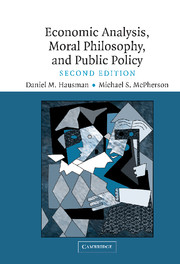III - LIBERTY, RIGHTS, EQUALITY, AND JUSTICE
Published online by Cambridge University Press: 06 July 2010
Summary
Though well-being is obviously important, people also care deeply about freedom, rights, equality, and justice – indeed, people risk their lives pursuing them. Economists would be wrong to assume that welfare is all that matters. Even if economists themselves had no interest in anything except welfare, they would still need to understand these other values in order to understand the goals of policy makers and to help devise policies that achieve these goals.
But it is patently not the case that economists are indifferent to these other moral concerns. On the contrary, economists care as deeply about freedom and justice as do other people. These other values may be difficult to understand, but welfare is not a simple notion either. In assessing economic outcomes, processes, institutions, and policies, economists need to be sensitive to the whole range of moral concerns.
In Part III we shall discuss many important moral notions under the headings of liberty and rights (in Chapter 10), equality (Chapter 11), and justice (Chapter 12). Our way of classifying the issues is an expository convenience, and readers should not take it too seriously. Nor should readers take our discussion of these important moral notions as exhaustive. For example, the deepest moral commitments of many of those concerned to protect wilderness areas are not captured in these chapters. What is important to keep in mind is that there are many important moral notions that are distinct from the notion of well-being.
- Type
- Chapter
- Information
- Economic Analysis, Moral Philosophy and Public Policy , pp. 157 - 158Publisher: Cambridge University PressPrint publication year: 2006



